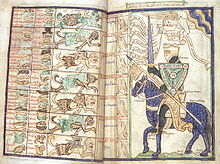William Perault
This article includes alist of references,related reading,orexternal links,but its sources remain unclear because it lacksinline citations.(April 2014) |

William Perault,(c. 1190 – 1271), also spelledPerauld;LatinizedPeraldusorPeraltus,was a Dominican writer and preacher.
Life
[edit]He was born atPeyraud,France.He studied at theSorbonne University of Paris,and there, being drawn to the religious life by the preaching perhaps ofJordan of Saxony,he was received into theDominican Order.
It is thought that Perault was somewhat advanced in years when he embraced the religious state, although the precise date of his entrance into it is also unknown. He entered the order atParis,but was destined, according to a custom then existing, for the convent atLyons.At Lyons, where he passed his life, at once contemplative and active, he rendered service to the Church by the brilliancy of his writings and preaching and by the charm and splendour of his virtues.
His part in ecclesiastical affairs was for a time also very important. For fully ten years he performed all the episcopal functions of the Church of Lyons, having been chosen for this work during the vacancy of theseebyPhilip I, Count of Savoywho, although not in Holy orders, bore the title ofArchbishop of Lyonfrom 1245 to 1267. Because of Perault's long labours in ministering to the needs of thediocese,he himself came to be known as the Bishop or Archbishop of Lyon. This error was further emphasized by the title of bishop which a later hand added to many of his writings. Authors such asGerson,Noël Alexandre,Jacques Échard,andHurtersay that William Perault was never Archbishop of Lyons, as theGallia christianaasserts,Louis Ellies du Pinis not justified in saying that he was never more than a religious of the Order of Preachers (cf.Antoine Touron,Hist. des hommes illust.,1, l.2, 184).
He died at Lyons.
Writings
[edit]His works include:
- Summa de virtutibus et vitiis(Cologne, 1497, 1618, 1629; Venice, 1492, 1497; Rome, 1557; Lyons, 1668)
- Sermones de tempore et de sanctis,which appeared under the name ofWilliam III of Paris(Paris, 1494; Cologne, 1629)
- De eruditione seu de institutione religiosorum(Paris, 1512; Louvain, 1575; Lyons, 1585)
- De regimine principum,which, as in the Roman edition of 1570, was attributed toThomas Aquinasand of which, in fact, Aquinas wrote a part:Speculum religiosorum seu institutionum vitae spiritualis,which appeared under the name ofHumbert de Romans,Master-General of the Order of Preachers.
References
[edit] This article incorporates text from a publication now in thepublic domain:Herbermann, Charles, ed. (1913). "William Perault".Catholic Encyclopedia.New York: Robert Appleton Company.
This article incorporates text from a publication now in thepublic domain:Herbermann, Charles, ed. (1913). "William Perault".Catholic Encyclopedia.New York: Robert Appleton Company.
